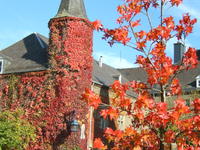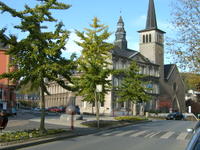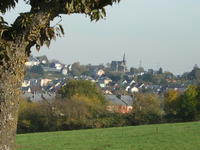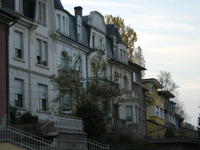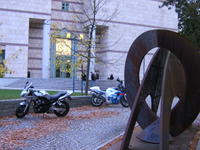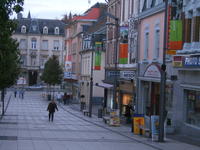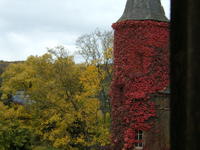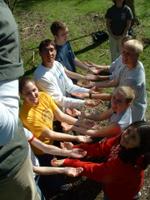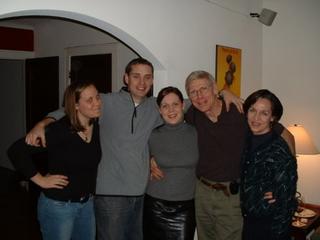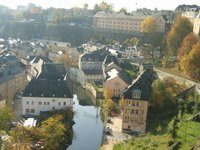

This may be the last post you'll see for about a week. I'll try to keep up with it but I don't know how much web access I'll have. I leave early tomorrow by train to Luxembourg City, Brussels, and the final destination of Amsterdam. I'm arriving early for the International Leadership Association conference, making sure the hostel where the Miami students and I will stay is acceptable, participating in the ILA Board Strategic Planning session, and helping to get the conference off to a good start. It will be an exciting and busy week and I won't be back to Luxembourg until Sunday, 11-6-05.
There were relatively few MUDEC regulars around the Chateau this weekend. It was a nice surprise when a group of Redhawks who are student teaching in Germany came in to meet with their Miami supervisor for the weekend. So, where I thought the Chateau would be empty, there were actually people here. I went to Luxembourg City Saturday - about 1 hour by train. It is an amazing place. It's relatively small but covers everything from ancient times of Roman occupation, through the middle-ages, and up to the modern. The old walled city of Luxembourg is a huge sunken ravine in the center of the city (these are the pics above). The way the walls were constructed to protect the town earned it the nickname of the Gibralter of the North centuries ago. Lux City is extremely cosmopolitan. There were people from all over the world strolling the streets. The palace of the Grand Duchy is in Lux City and this area is one of the most active with shopping, restaurants, historical sites, etc.
I took a bus tour of the entire city which allowed me to hop on and off where I wanted. Other than the walled city, my favorite area was the Kirchberg Plateau, which is where the EU headquarters are. This has the most amazing collection of contemporary architecture I've ever seen. They have a spectacular sports and culture center that has multiple overlapping shell-like roofing. The new philharmonic hall is a brilliant white marble with three beautifully sculpted shapes complementing each other. The new I.M. Pei Art Gallery is under construction and adapts acorns as design motifs. Literally, every where you look is a feast for the eyes. This center is one of the three EU centers of commerce, government, and law. The staff who work for the EU live primarily in the Kirchberg area. With its ultra-modern offices, comfortable housing, entertainment and sports, and a wonderful shopping center, you might never actually need to leave.
Sunday morning I took the chance to get up early to attend church. I walked across the street (the spires you've seen in previous pictures are the building) to a Catholic church. The service was in German (Priest), French (Liturgist), and the music was all in Latin. Although I am not Catholic and regardless of language, I knew exactly what was happening, picking up on the natural unfolding of universal ritual. It was funny when they distributed a satisfaction questionnaire throughout the congregation. It was in German and French, some of which I could deduce. However, I was in real trouble when one of the ushers came to pick mine up and I hadn't done a thing. He immediately helped me be tearing different corners of the sheet to indicate the demographics of my background (sex, age) and where I was from. Then there was a question that asked if I was satisfied with the service - how could I say anything but "yes!" It felt good just to be in the presence of shared values, if not common experience.
